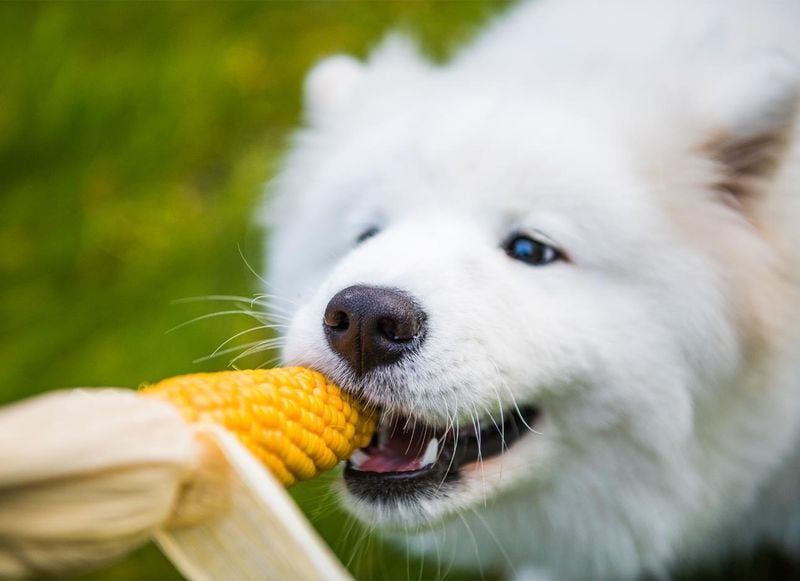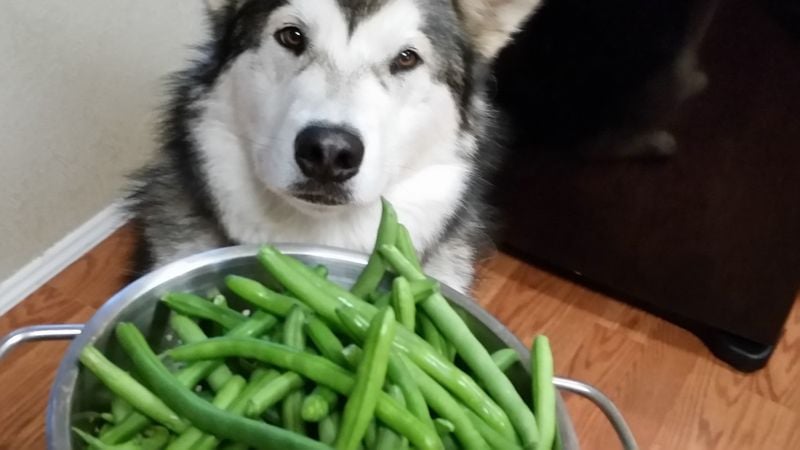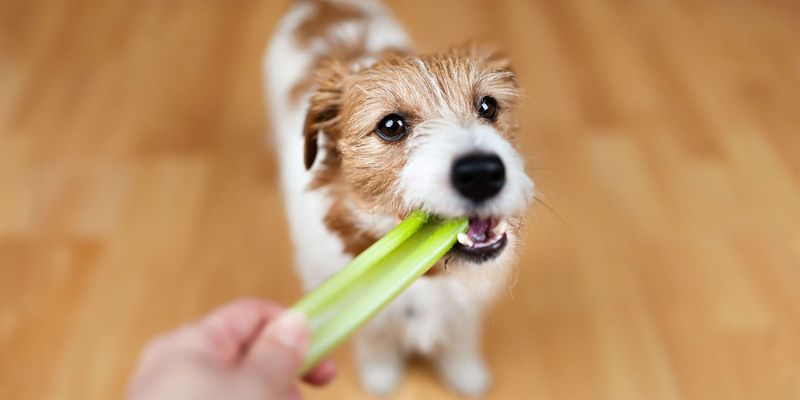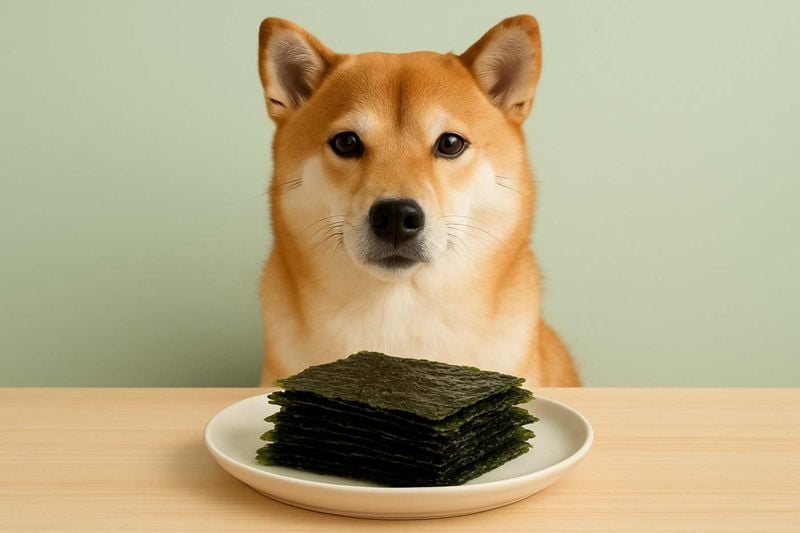20 Vegetables That Are Totally Safe for Your Dog to Eat
Many dog owners find themselves wondering which human foods are safe to share with their furry companions. While some foods—like chocolate, onions, and grapes—can be dangerous, there are also plenty of healthy options that can benefit your dog when given in moderation. Vegetables, in particular, can be a nutritious, low-calorie addition to your pup’s diet.
Adding dog-safe vegetables to your pet’s meals or using them as treats is a great way to boost fiber, vitamins, and minerals. They can aid digestion, support weight management, and provide natural variety without the artificial ingredients found in many store-bought treats. Plus, many dogs love the crunch and taste of raw or lightly cooked veggies.
That said, not all vegetables are safe for dogs, and it’s important to know which ones to avoid. You should also prepare them properly—steamed, chopped, or plain with no added salt or seasonings—to make them easier to digest and more enjoyable for your dog.
To help take the guesswork out of feeding time, we’ve compiled a list of 20 vegetables that are completely safe for dogs to eat. These picks are packed with nutrients and easy to prepare, whether you’re adding them to your dog’s dinner or handing them out as a healthy treat. Let’s dig in!
1. Broccoli: The Miniature Tree Treat
Dogs can munch on these little green trees in moderation. Broccoli contains vitamins C and K, fiber, and potassium that support your pup’s immune system and bone health.
The florets make perfect bite-sized treats for training sessions. Just be careful not to overdo it – broccoli contains isothiocyanates that can cause mild stomach irritation if your dog eats too much.
Steam or lightly cook broccoli to make it easier to digest, and always cut it into small pieces to prevent choking hazards. Many dogs enjoy the crunchy texture and distinctive flavor of this nutritious veggie!
2. Carrots: Crunchy Orange Delights
Raw carrots serve as nature’s toothbrush for dogs, helping to scrape away plaque while they chew. The satisfying crunch makes these beta-carotene powerhouses a hit with pups of all sizes.
Beyond dental benefits, carrots deliver vitamin A for eye health, potassium, and fiber. They’re also naturally sweet without containing excessive calories, making them perfect for dogs watching their weight.
Frozen baby carrots offer cooling relief during hot summer days. For smaller dogs, consider grating carrots over their regular food or steaming them for easier digestion and maximum nutrient absorption.
3. Spinach: Leafy Green Superfood
This nutrient-packed leafy green delivers an impressive array of vitamins A, B, C, and K to your four-legged friend. Spinach also contains iron, antioxidants, and beta-carotene that support overall canine health and immunity.
Despite internet rumors, the oxalic acid in spinach poses minimal risk to healthy dogs when fed occasionally in small amounts. The benefits typically outweigh any concerns for most pups.
Lightly steam spinach to break down the cell walls for better nutrient absorption. Mix small amounts into your dog’s regular food rather than serving it alone – most dogs prefer it mixed with something more appealing to their carnivorous taste buds.
4. Cucumber: Hydrating Low-Calorie Snack
Perfect for hot days, cucumbers are 96% water, making them an excellent hydrating treat for active dogs. Their crisp texture and mild flavor appeal to many canines who enjoy the refreshing crunch.
Virtually calorie-free, cucumbers are ideal for overweight dogs or those on restricted diets. They contain vitamins K, C, and B1, along with potassium, copper, and magnesium that support various bodily functions.
Remove the skin if it’s waxed or treated with pesticides. Slice cucumbers into appropriate sizes to prevent choking – coin-shaped for larger dogs and julienned strips for smaller breeds.
Many dogs particularly enjoy frozen cucumber slices during summer months!
5. Sweet Potato: Nature’s Orange Candy
Packed with dietary fiber, sweet potatoes help keep your dog’s digestive system running smoothly. Their natural sweetness makes them irresistible to most dogs, while their nutritional profile impresses health-conscious pet parents.
These orange tubers deliver beta-carotene, vitamins A, C, and B6, plus minerals like potassium and manganese. The complex carbohydrates provide sustained energy without the blood sugar spikes of processed treats.
Always serve sweet potatoes cooked – baked, steamed, or boiled – never raw. Remove the skin, which can be difficult to digest, and avoid adding butter, salt, or seasonings.
Dehydrated sweet potato slices make excellent chewy treats that promote dental health.
6. Corn: Golden Kernels of Goodness
Fresh corn kernels (always removed from the cob) provide dogs with protein, carbohydrates, and linoleic acid – an omega-6 fatty acid that supports skin and coat health. Many dogs love the sweet taste and satisfying texture of this summer staple.
Rich in fiber, corn aids digestion when served in moderation. It also contains beneficial antioxidants like lutein and zeaxanthin that support eye health in aging dogs.
Never give your dog corn on the cob – the cob poses a serious choking hazard and can cause intestinal blockages if swallowed.
Serve plain, cooked kernels without butter, salt, or seasonings as an occasional treat mixed with regular food or as training rewards.
7. Cauliflower: Versatile White Florets
This cruciferous vegetable offers impressive nutritional benefits in a low-calorie package. Cauliflower delivers vitamins C, K, and B6, along with folate, potassium, manganese, magnesium, and phosphorus to support your dog’s health.
The fiber content aids digestion, though some dogs may experience mild gas when first introduced to cauliflower. Start with small amounts and increase gradually to avoid digestive upset.
Steam or lightly cook cauliflower before serving – raw florets can be difficult to digest and pose a choking risk for enthusiastic eaters.
Cut into appropriate bite-sized pieces and avoid adding any seasonings, butter, or oil that could upset your pup’s stomach.
8. Zucchini: Mild Summer Squash
Low in calories yet high in fiber, zucchini makes an excellent filler for dogs who need to watch their weight. Its high water content (over 90%) helps keep your pup hydrated while providing essential nutrients.
Zucchini contains vitamins A, C, and K, plus minerals like potassium and manganese. The mild flavor generally appeals to dogs, making it easier to incorporate into meals than stronger-tasting vegetables.
Serve raw zucchini grated over food or cut into sticks as crunchy treats. For easier digestion, particularly for senior dogs, lightly steam or cook it. Always remove any seeds from larger, mature zucchini before sharing with your canine companion.
9. Lettuce: Crispy Green Crunch
Both romaine and iceberg varieties offer hydrating crunch with minimal calories. The high water content makes lettuce particularly refreshing during warmer months, while the fiber supports healthy digestion.
Romaine provides more nutritional value with vitamins A, K, and C, plus folate and calcium. Iceberg, while less nutrient-dense, still offers a satisfying texture many dogs enjoy tearing into.
Thoroughly wash all lettuce to remove pesticides or contaminants. Tear into appropriate sizes to prevent choking and introduce gradually – too much can cause loose stools due to the high fiber content.
Many dogs enjoy chasing and catching lettuce leaves as interactive treats!
10. Green Beans: Slender Nutrition Powerhouses
Fresh, frozen, or canned (with no salt added), green beans make excellent low-calorie treats that satisfy your dog’s craving to chew. They’re packed with vitamins A, C, and K, plus minerals like manganese and fiber for digestive health.
Veterinarians often recommend green beans as part of a weight management plan – the “green bean diet” involves gradually replacing a portion of your dog’s food with green beans to reduce calories while maintaining fullness.
Cut longer beans into bite-sized pieces to prevent choking. Steam or lightly cook them for easier digestion, though many dogs happily crunch on raw beans. Their satisfying texture makes them perfect training treats that won’t expand your pup’s waistline!
11. Peas: Tiny Green Nutrition Bombs
These small green spheres pack impressive nutritional punch, containing vitamins A, B, C, and K, plus minerals like iron, zinc, potassium, and magnesium. Their natural sweetness appeals to most dogs, making them an easy vegetable to introduce.
Fresh, frozen, or thawed peas all work well as treats. Their small size makes them perfect training rewards or food toppers without significant preparation. The protein and fiber in peas support muscle maintenance and digestive health.
Avoid canned peas with added sodium, and don’t overdo it – too many can cause gas or bloating in sensitive dogs. For smaller breeds, consider mashing peas slightly to prevent potential choking.
12. Celery: Crunchy Breath Freshener
This fibrous vegetable delivers satisfying crunch while helping to freshen your dog’s breath naturally. The high water content (about 95%) makes celery a hydrating treat, especially welcome during hot weather or after exercise.
Celery contains vitamins A, C, and K, plus potassium, folate, and manganese. The fiber supports digestive health, and some believe it may help reduce inflammation in arthritic dogs, though research is limited.
Cut celery into bite-sized pieces to prevent choking. Remove the stringy parts for smaller dogs or those with dental issues. Many dogs enjoy celery sticks spread with a small amount of dog-safe peanut butter (xylitol-free) as a special treat!
13. Kale: Dark Green Nutritional Powerhouse
Packed with vitamins A, K, and C, this leafy green superfood supports immune function, bone health, and vision in dogs. Kale also provides calcium, potassium, and a range of antioxidants that combat cellular damage.
Despite its benefits, kale should be served in moderation. It contains natural compounds called isothiocyanates that can irritate the digestive tract in large amounts, and oxalates that might affect dogs prone to certain types of bladder stones.
Lightly steam kale to break down the tough cell walls and make nutrients more available. Chop finely and mix small amounts with more appealing foods – few dogs will eat plain kale. Freeze small portions to add to meals throughout the week.
14. Brussels Sprouts: Miniature Cabbage Balls
These compact cruciferous vegetables deliver impressive nutrients including vitamins K and C, manganese, potassium, and folate. Their fiber content supports digestive health and may help regulate blood sugar levels.
The well-known downside? Brussels sprouts can cause gas in dogs, just as they do in humans. Start with very small amounts and increase gradually to allow your dog’s digestive system to adjust.
Always cook Brussels sprouts before serving – steaming, boiling, or roasting (without oil or seasonings) makes them easier to digest. Cut them into smaller pieces appropriate for your dog’s size.
Despite their potential for causing flatulence, many dogs enjoy their unique flavor and texture!
15. Bell Peppers: Colorful Vitamin C Boosters
All colors of bell peppers are safe for dogs, with red ones containing the most nutrients due to their longer ripening time. These crunchy vegetables are packed with vitamins A, C, E, and B6, plus beneficial antioxidants.
The sweet flavor and satisfying texture appeal to many dogs. Remove the seeds and inner white membrane before serving, as these parts can be bitter and harder to digest. Raw bell pepper strips make excellent low-calorie treats.
For easier digestion, especially for senior dogs, lightly steam or roast them without seasonings. Many veterinarians recommend bell peppers for their immune-boosting properties and anti-inflammatory benefits.
16. Pumpkin: Orange Digestive Superhero
Often recommended by veterinarians, plain pumpkin (not pie filling) works magic on canine digestive issues. Its soluble fiber helps firm up loose stools or relieve constipation, making it a versatile digestive remedy.
Beyond digestive benefits, pumpkin provides vitamins A, C, and E, plus potassium and iron. The natural sweetness appeals to most dogs, making it easy to incorporate into their diet.
Use plain canned pumpkin (not pie filling with spices and sugar) or cook and mash fresh pumpkin. Start with 1-2 teaspoons for small dogs and 1-2 tablespoons for larger breeds.
Freeze portions in ice cube trays for convenient, ready-to-serve digestive support whenever needed!
17. Squash: Buttery Vitamin Bounty
Butternut, acorn, and other winter squashes offer excellent nutrition for your canine companion. Rich in vitamins A and C, potassium, and fiber, these vegetables support immune function, vision, and digestive health.
The natural sweetness and soft texture when cooked make squash appealing to most dogs. Their complex carbohydrates provide sustained energy without blood sugar spikes, beneficial for diabetic dogs.
Always cook squash thoroughly – baking, steaming, or boiling work well – and remove seeds and skin before serving. Mash or cube depending on your dog’s preference. Avoid adding butter, oil, or seasonings that could upset your pup’s stomach.
18. Parsnips: Sweet Underground Treasures
Often overlooked, parsnips offer a naturally sweet flavor that many dogs enjoy. These root vegetables contain folate, potassium, and fiber, plus vitamins C and E to support overall health.
The starchy texture satisfies dogs who enjoy something substantial to chew. Their natural sweetness comes from starches converting to sugars after frost exposure, making them particularly appealing in winter months.
Always cook parsnips before serving – roasting enhances their natural sweetness, though steaming or boiling works well too.
Cut into appropriate sizes for your dog’s mouth or mash for senior pets. The fiber content supports digestive health, but introduce gradually to avoid gas or bloating.
19. Beets: Ruby Red Antioxidant Gems
These vibrant root vegetables contain valuable nutrients like folate, manganese, potassium, and vitamin C. Their unique pigments deliver powerful antioxidants that support cellular health and may help reduce inflammation.
Beets’ natural sweetness appeals to many dogs, though the earthy flavor might not win over every pup. Their fiber content supports digestive health, while their natural nitrates may improve blood flow and heart health.
Always serve beets cooked – roasted, steamed, or boiled – and cut into appropriate pieces. Be prepared for pink-tinged stool or urine, which is harmless but can be startling!
Introduce gradually as beets’ high natural sugar content might cause digestive upset if overfed.
20. Seaweed: Ocean’s Green Gift
Nori and other dried seaweeds offer an impressive array of minerals including iodine, iron, and magnesium. These sea vegetables contain unique compounds not found in land plants, supporting thyroid function and overall health.
The umami flavor appeals to many dogs, and the crispy texture makes seaweed an interesting sensory experience. Look for plain, unseasoned varieties without added salt or flavorings.
Serve in small amounts – a little goes a long way due to concentrated nutrients. Tear into appropriate pieces to prevent choking.
While beneficial in moderation, too much seaweed can cause iodine overload or digestive upset, so treat it as an occasional superfood boost rather than a daily addition.


























